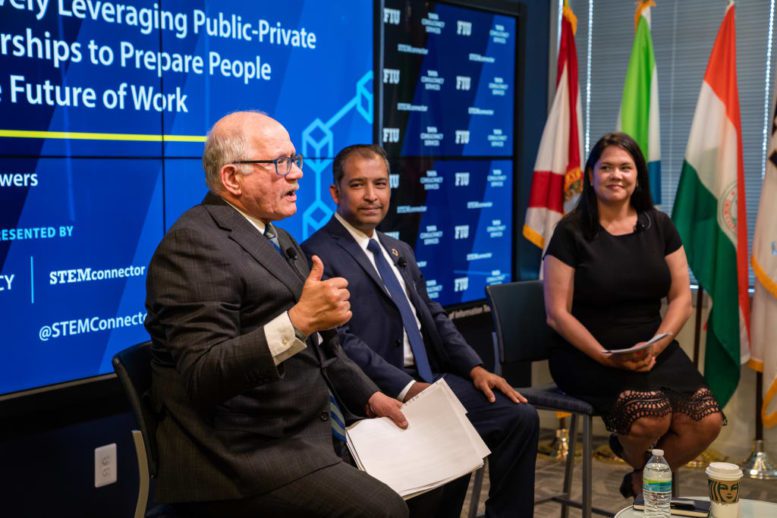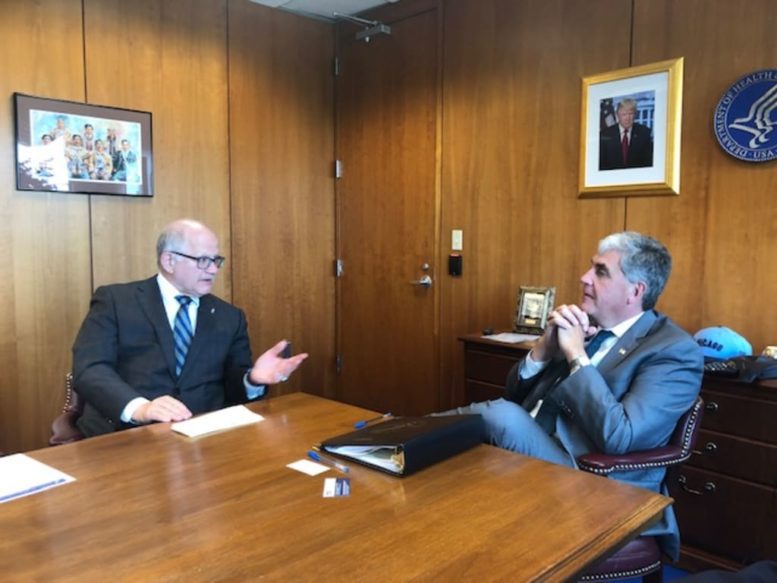
Earlier this month, the university participated in multiple conversations about the nation’s future through FIU’s hub in Washington, D.C. Here are some of the highlights.
STEM education is transforming
The education nonprofit STEMConnector and Tata Consultancy Services (TCS) joined FIU in Washington, D.C., on July 16 for an afternoon seminar exploring ways to improve science, technology, engineering and math (STEM) education through public and private partnerships.
The event, “Effectively Leveraging Public-Private Partnerships to Prepare People for the Future of Work,” brought together professionals and stakeholders who want to improve how students learn and practice skills needed in STEM careers. The group also discussed inclusion and diversity in the workforce.
The panel, which included President Mark B. Rosenberg, explained that partnerships between the public and private sectors modernize the way STEM courses are taught and increase the opportunities for students to gain experience through internships and apprenticeships.
According to President Rosenberg, the new technologies and work routines in STEM fields require new teaching methods that are possible through public-private partnerships.
“The way we teach science in the next decade is fundamentally going to change,” said Rosenberg, who has co-authored two STEM education reports for the National Academy of Sciences. “In part because of data science, in part because of artificial intelligence.”
FIU’s own leadership in STEM education focuses on classroom transformation through modeling instruction and learning assistants that have been trained across multiple disciplines. Currently, more than 12,000 students in 44 courses benefit from the leadership of more than 375 learning assistants trained through FIU’s STEM Transformation Institute.
“The STEMConnector event really opened my eyes to the various projects and initiatives that are being undertaken by both teachers and independent companies to better prepare students for the professional world,” said Anilegna Nuñez, a sophomore studying mechanical engineering who is interning at the U.S. Department of Energy.
Advocating for research into brain health
Earlier that day, Rosenberg visited the U.S. Department of Health and Human Services (HHS), where he and leadership from the Robert Stempel College of Public Health & Social Work met Deputy Secretary Eric D. Hargan, Assistant Secretary for Health Brett P. Giroir and Assistant Secretary for Health and Human Services Robert Kadlec.
Rosenberg and Jason R. Richardson, associate dean of the Stempel College, briefed the administration on current FIU research that is exploring the relationship between genetics and the environment in the progression of neurodegenerative diseases in minorities.
“The close collaborative relationship between the two emerging preeminent programs in the college and the relationships with minority communities in Miami, Latin America and the Caribbean has Stempel College and FIU poised to continue our highly impactful work in these areas and expand into new directions focused on health disparities in minority communities as they relate to diseases of the brain and aging,” Richardson said.
Meeting Panthers in D.C.
President Rosenberg also visited the Florida House on Capitol Hill to meet the cohort of summer interns in Washington, D.C.
“Having lunch with President Rosenberg at the Florida House was one of the highlights of my summer, said Janelle Mendez ’19, who is interning at New America. “President Rosenberg took the time to engage with the FIU interns and listen to our suggestions on how to make FIU better for current and future Panthers.”
The interns working at nonprofits, think tanks, corporations and Capitol Hill are part of the Talent Lab at FIU in DC, where they attend networking and academic events that enhance their experience at the capital.






